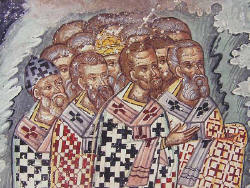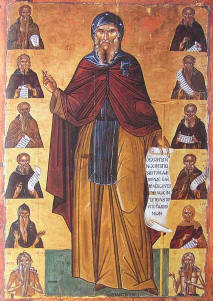
Some of the holy fathers are called apologists because they defended the Christian teachings against those outside the Church who ridiculed the faith. Their writings are called apologies which means “answers” or “defenses.”
Others of the holy fathers defended the Christian faith against certain members of the Church who deformed the truth and life of Christianity by choosing certain parts of the Christian revelation and doctrine while denying other aspects. Those who deformed the Christian faith in this way and thereby destroyed the integrity of the Christian Church are called the heretics, and their doctrines are called heresies. By definition heresy means “choice,” and a heretic is one who chooses what he wants according to his own ideas and opinions, selecting certain parts of the Christian Tradition while rejecting others. By his actions, a heretic not only destroys the fullness of the Christian truth but also divides the life of the Church and causes division in the community.
Generally speaking, the Orthodox tradition regards the teachers of heresies as not merely being mistaken or ignorant or misguided; it accuses them of being actively aware of their actions and therefore sinful. A person merely misguided or mistaken or teaching what he believes to be the truth without being challenged or opposed as to his possible errors is not considered to be a heretic in the true sense of the word. Many of the saints and even the holy fathers have elements in their teachings which Christians of later times have considered as being false or inaccurate. This, of course, does not make them heretics.
Not all of the holy fathers were defenders against falsehood or heresy. Some of them were simply the very positive teachers of the Christian faith, developing and explaining its meaning in a deeper and fuller way. Others were teachers of the spiritual life, giving instruction to the faithful about the meaning and method of communion with God through prayer and Christian living. Those teachers who concentrated on the struggle of spiritual life are called the ascetical fathers, asceticism being the exercise and training of the “spiritual athletes”; and those who concentrated on the way of spiritual communion with God are called the mystical fathers, mysticism being defined as the genuine, experiential union with the Divine.
All of the holy fathers, whether they are classified as theological, pastoral, ascetical or mystical gave their teachings from the sources of their own living Christian experience. They defended and described and explained the theological doctrines and ways of spiritual life from their own living knowledge of these realities. They blended together the brilliance of the intellect with the purity of the soul and the righteousness of life. This is what makes them the holy fathers of the Church.

The writings of some of those fathers who have received the universal approval and praise of the Church through the ages are of particular importance, such as those of Ignatius of Antioch, Irenaeus of Lyons, Athanasius of Alexandria, Basil the Great, Gregory of Nyssa, Gregory the Theologian, John Chrysostom, Cyril of Alexandria, Cyril of Jerusalem, Maximus the Confessor, John of Damascus, Photius of Constantinople, and Gregory Palamas; and those of the ascetical and spiritual fathers such as Anthony of Egypt, Macarius of Egypt, John of the Ladder, Isaac of Syria, Ephraim of Syria, Simeon the New Theologian, and others.
Sometimes it is difficult for us to read the writings of the fathers of the Church since their problems were often complicated and their manner of writing very different in style from our own. Also most of the spiritual and ascetical writings are put in the monastic setting and have to be transposed in order to be understandable and usable to those of us who are not monks or nuns. Nevertheless, it is important to read the writings of the fathers directly. One should do so slowly, a little at a time, with careful thought and consideration and without making quick and capricious conclusions… the same way that one would read the Bible. Among the church fathers, Saint John Chrysostom’s writings are very clear and direct and can be read by many with great profit if the proper care is given. Also the Philokalia—an anthology of spiritual writings—exists in English, at least in part, and with proper care, it can be helpful to a mature Christian in search of deeper insights into the spiritual life.